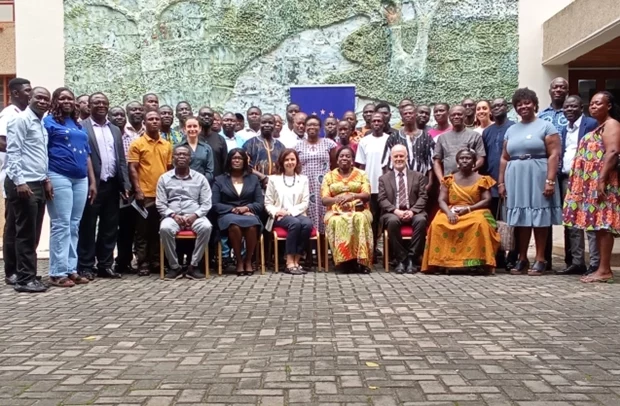Ms. Paulina Rozycka (3rd L) with some EU members and other grantees
The European Union (EU) has launched a €2.4 million forest restoration initiative aimed at rehabilitating degraded landscapes and boosting livelihoods across the country’s high forest and savanna ecological zones.
The project, unveiled at the Forestry Research Institute of Ghana (FORIG) in Kumasi brought together four grantee organisations—Proforest, World Vision, Nature and Development Foundation, and Goshen Global Vision—to undertake large-scale landscape restoration over the next two years.
Addressing participants, Sustainable Head of Infrastructure Development at the EU Delegation to Ghana, Paulina Różycka, emphasised the central role the country’s forests play in biodiversity conservation, climate resilience, and the wellbeing of millions. She noted that the country’s forests continue to face increasing threats from agricultural expansion, mining, illegal logging, wildfires, and land tenure challenges.
“Restoring forest landscapes is not just a national priority but a global necessity,” Ms. Różycka said. “Forest restoration is a proven nature-based solution that supports climate mitigation, biodiversity conservation, and sustainable development.”
The four selected projects are expected to restore 5,000 hectares of forest and improve the livelihoods of 20,000 farmers and rural households through agroforestry practices, natural regeneration, beekeeping, eco-enterprises, and community savings schemes. Women and youth are expected to play a key role throughout the implementation.
Ms. Różycka highlighted that the projects align strongly with the country’s forest sector policies, including the Forest and Wildlife Policy, the Ghana Forest Landscape Restoration Strategy, and the national “Tree for Life” campaign.
She further noted that 2025 marks major progress for Ghana’s forest governance with the commencement of FLEGT licensing for timber exports—an important milestone demonstrating strengthened forest law enforcement and sustainable timber production.
The EU restoration grants fall under the EU Sustainable Forest and Cocoa Programme, implemented in partnership with the European Forest Institute (EFI). The programme promotes climate-smart agriculture, resilient landscapes, and sustainable value chains in forest-dependent communities.
Welcoming participants to FORIG, Deputy Director of the Institute, Dr. Mrs. Lucy Amissah, commended the EU and EFI for selecting the institution as the venue for the project launch.
She emphasised that the initiative complements FORIG’s mandate to advance sustainable forest management, climate resilience, and improved livelihoods.
“Ghana’s forests are essential for biodiversity, water and food security, and the livelihoods of millions, yet they face enormous pressures,” she said. “This launch marks another milestone in our national commitment to restoring degraded forest landscapes.”
Dr. Amissah expressed optimism that the projects would significantly improve environmental sustainability and called on participants to explore FORIG’s facilities.
Ms. Różycka thanked all stakeholders—including EFI, the project teams, FORIG, and the Government of Ghana—for their commitment, describing the collaboration as “sowing the seeds of resilience, equity, and hope.” She expressed confidence that by 2027, the projects would deliver meaningful impacts for Ghana’s forests and communities.
FROM David Afum, Kumasi


